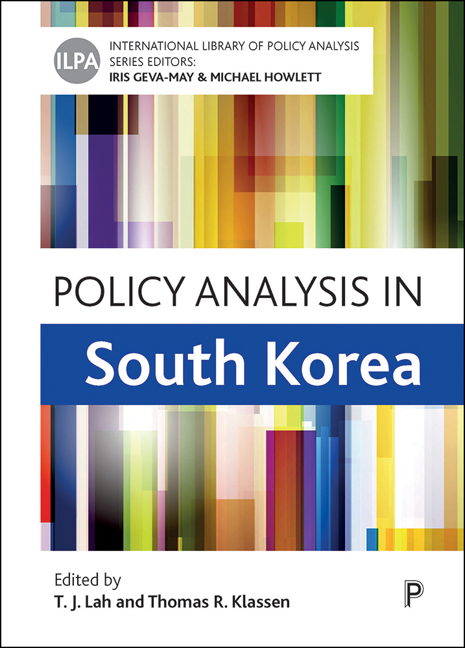Book contents
- Frontmatter
- Dedication
- Contents
- List of figures, tables and boxes
- List of abbreviations
- Notes on contributors
- Acknowledgements
- Editors’ introduction to the series
- Foreword
- Part One Overview of policy analysis in Korea
- Part Two Policy analysis by governments
- Part Three Committees, consultants, media, public inquiries and public opinion
- Part Four Parties, interest groups and advocacy-based policy analysis
- Part Five Academia, research institutes and policy analysis
- Index
one - An introduction to policy analysis in Korea
Published online by Cambridge University Press: 18 January 2024
- Frontmatter
- Dedication
- Contents
- List of figures, tables and boxes
- List of abbreviations
- Notes on contributors
- Acknowledgements
- Editors’ introduction to the series
- Foreword
- Part One Overview of policy analysis in Korea
- Part Two Policy analysis by governments
- Part Three Committees, consultants, media, public inquiries and public opinion
- Part Four Parties, interest groups and advocacy-based policy analysis
- Part Five Academia, research institutes and policy analysis
- Index
Summary
The emergence and development of policy analysis in Korea
It is not new in social sciences for information or knowledge to be used as the basis for government policy, programmes or social reform. Normally, the results of policy research can enable the government to review existing programmes or introduce new programmes by raising new policy issues or presenting new interpretations or solutions to existing problems. A long time ago, the traditional policy sciences stressed that the key to promoting human dignity and improving the welfare of human beings was enhancing the rationality of the policy process, and that this requires appropriate policy information and knowledge. It was essential that such information identify potential policy problems in advance and provide a thorough analysis and evaluation of values and facts related to the problem (for more detail, see Oh, 2015).
All knowledge of the policy process can be used as policy information, but the analysis and evaluation of policy phenomena and the ensuing consequences are very important forms of policy information for rational policymaking. However, policy analysis and evaluation did not emerge and spread overnight. Although accurately tracing the history of development is not possible, it is safe to say that policy analysis and evaluation have been around since public administration or policy studies were first adopted as specialised academic fields.
In South Korea (henceforth ‘Korea’), policy studies emerged under the name policy science in general or policy formation as part of the regular curriculum for public administration in the late 1960s. In the late 1970s, full-scale education regarding policy science began as a separate academic field that was independent from law, political science, and public administration. Since the 1980s, education programmes related to policy science have been actively promoted at graduate schools, and the Korea Association for Policy Studies, a professional organisation for students of policy science, was founded in 1992 (see Oh, 2016).
On the other hand, the time when policy analysis began to draw attention in Korea also overlaps with the introduction of policy studies and its development period in a broader context. As has been noted, a range of analytical techniques have been developed across various social science fields. It seems that policy analysis began to gain recognition and take root as an independent field in the 1960s (Rho, 2006).
Information
- Type
- Chapter
- Information
- Policy Analysis in South Korea , pp. 3 - 12Publisher: Bristol University PressPrint publication year: 2023
